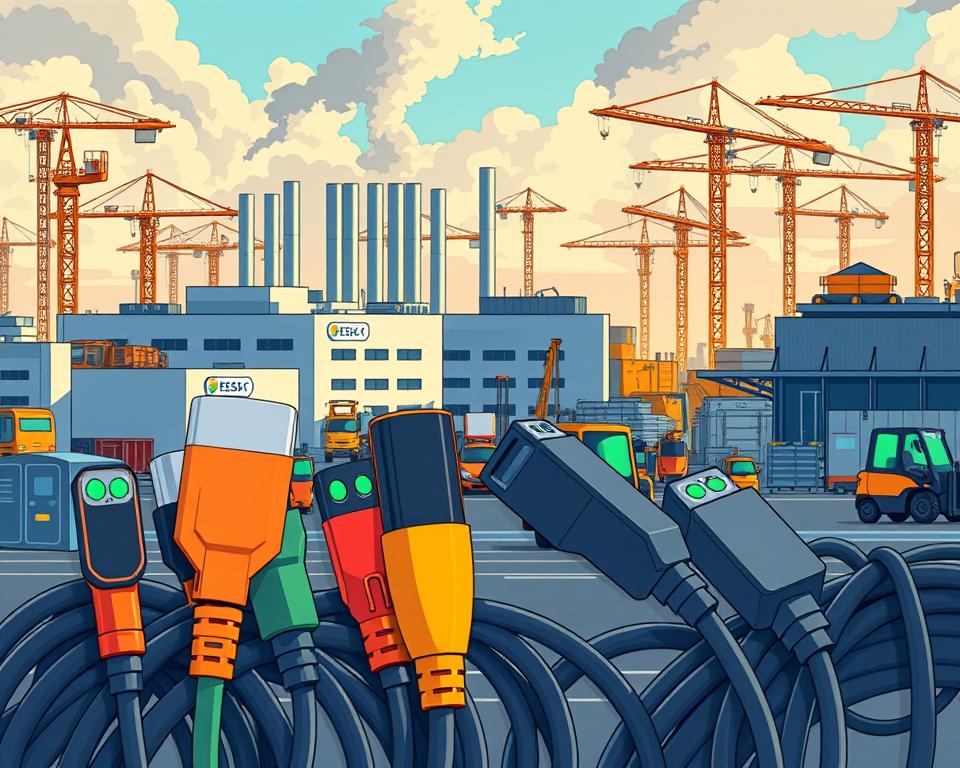Premier EV Charging Cable Manufacturers for Your Electric Vehicle
The electric vehicle industry is on the rise, with the demand for reliable and high-performance charging solutions surging. Currently, leading companies have been at the vanguard of this change, providing top-tier charging infrastructure. Southwire, for instance, entered the market in 2014 and excels, garnering 1000+ five-star reviews and 75 years of experience in the electrical construction industry.
The rise in electric vehicle adoption creates a requirement for durable, fast, and reliable Charger Manufacturers in China. Top manufacturers are innovating to meet these evolving needs, offering solutions that improve the overall charging experience.
Grasping the distinctions between various charging solutions is essential for choosing correctly. Quality charging infrastructure directly influences vehicle performance and user experience.
Main Points
- Top manufacturers offer high-quality charging cables for improved durability and safety.
- EV market expansion drives need for high-efficiency chargers.
- Top brands pioneer solutions for changing EV requirements.
- Quality charging cables directly impact charging efficiency and vehicle performance.
- Opting for top-tier cables yields future savings.

Why High-Quality EV Cables Matter
As more drivers choose EVs, the importance of high-quality EV charging cables is immense. The efficiency, safety, and dependability of electric vehicle charging systems hinge upon the quality of the charging cables used.
How EV Charging Tech Has Advanced
Charging tech for EVs has evolved rapidly, with a shift toward faster charging speeds and improved safety features. Modern EV charging cables are designed to meet these evolving needs, incorporating high-grade materials and advanced designs to minimize energy waste and maximize transfer rates.
Quality’s Impact on EV Charging
Quality charging cables directly impact the overall performance and safety of EV charging infrastructure. Robustness, such as weather resistance and temperature tolerance, maintain performance in harsh conditions. Moreover, meeting standards and following protocols are essential in ensuring that cables meet rigorous safety requirements.
| Key Features | Benefits |
|---|---|
| Superior materials and construction | Reduced energy waste |
| Enhanced durability features | Weather resistance, flexibility in extreme temperatures |
| Standards adherence | Rigorous safety requirements met |
| Maintainability | Repairable design for longevity |
Our high-performance cable solutions, such as those offered by Aichie Tech Electronics, are tested for quality and compliance in The Cable Lab. By opting for serviceable Portable EV Charger Manufacturer, repairable designs reduce lifetime costs, lowering environmental impact.
Premier Chinese EV Cable Suppliers
China is home to a growing number of EV charging cable manufacturers. These companies are crucial in supporting the expanding electric vehicle (EV) market, offering premium charging cables designed for different applications.
Wottz – Top EV Cable Maker from 2014
Wottz has established itself as a prominent player in the EV charging cable market since 2014. They offer a range of cables that meet the specific requirements of EV charging systems, from Mode 1, 2, 3, and fast-charging Mode 4 DC Charging.
Aichie Tech Electronics’ 75-Year Legacy
Aichie Tech Electronics’ seven-decade legacy informs its premium cable designs. Their products are designed to meet the demands of both domestic and commercial EV charging infrastructure.
Additional Key Cable Suppliers
Specialists in Type 1/Type 2 connectors and environmental-resistant cables are emerging players. These include Type 1 & 2 connector experts, as well as companies developing cables with enhanced flexibility and resistance to environmental factors.
A Guide to EV Cable Types
As electric vehicles become increasingly popular, understanding the various types of EV Charging Cable Manufacturers is crucial for optimal charging experiences. Different cables suit different charging needs. The variety in EV charging infrastructure demands a closer look at the different cable types available.
Comparing SAE J1772 and Mennekes Cables
SAE J1772 (Type 1) and Mennekes (Type 2) are the main global standards. Type 1, also known as SAE J1772, is predominantly used in North America, while Type 2, or Mennekes, is the standard in Europe. The choice between these cables depends on the vehicle’s connector type and the charging station’s compatibility. Type 2 cables often handle greater power, making them suitable for faster charging.
AC Level2 vs DC Fast Charging
Level 2 AC cables charge faster, up to 19.2 kW. DC Fast Charging cables, on the other hand, provide rapid charging by converting AC power to DC within the charging station, allowing for much faster charging times. These cables are key for highway charging, letting EVs charge in minutes.
Portable and Tethered Cable Options
Portable EV charging cables, such as “Granny chargers,” offer flexibility by allowing owners to charge their vehicles from standard household outlets. Tethered cables are fixed to charging stations, providing a convenient but less flexible charging solution. The choice comes down to flexibility vs convenience.
Cable length, power rating, and connector type matter most. For instance, portable charging cables range from basic Level1 emergency chargers to more robust Level2 solutions. Vehicle-to-load (V2L) cables represent an emerging category, enabling EVs to power external devices.
- Flexible granny chargers and L2 units suit various needs.
- Fixed cables add convenience, removing cable management tasks.
- Cable length is a critical consideration, with options ranging from 5-meter standard cables to 50-meter extended cables.
Key Features of High-Quality EV Charging Cables
Premium cables stand out for durability, safety, and performance. These features are vital to safe, efficient charging.
Durability and Weather Resistance
Cables must withstand rain, sun, and cold. Manufacturers like Wottz and Southwire craft their cables from recyclable materials that adhere to ROHS compliance, ensuring they withstand various environmental conditions. Their serviceable design facilitates easy maintenance and promotes recycling.
Flexibility and Ease of Use
Flexibility and ease of use are also critical factors. High-quality EV charging cables are built for easy handling without sacrificing strength. This flexibility is combined with rugged construction for lasting performance.
Certified Safety and Standards
Approved safety marks ensure reliable performance. They ensure their products meet or exceed standards such as IEC62196 for connectors and UL2594 in North America. Rigorous third-party testing evaluates electrical safety, mechanical durability, and environmental resistance.
| Certification | Description | Region |
|---|---|---|
| IEC62196 | Connector safety standards | International |
| UL2594 | Standard for electric vehicle supply equipment | North America |
| ROHS | Restriction of hazardous substances | International |
By focusing on these key features, manufacturers can provide EV charging cables that not only meet the highest quality and safety standards but also enhance the overall user experience.
Cutting-Edge EV Cable Innovations
New cable tech is transforming EV charging, with a focus on ultra-fast charging, improved signal integrity, and sustainable compounds.
Liquid Cooling for Rapid EV Charging
Cooling fluids enable higher charge rates, enabling electric vehicles to charge at significantly higher speeds without overheating.
Signal-Boosting Contact Designs
Hyperboloid contact points improve electrical connection, ensuring stable communication and power flow.
Green Charging Cable Designs
Companies focus on green materials, minimizing ecological footprint with RoHS-compliant, serviceable builds. For instance, companies like Aichie Tech Electronics and Wottz are embracing repairable designs and strict standards to foster reuse.
Programs for cable recycling, non-toxic compounds, and TPU sheaths mark the eco shift.
Choosing the Perfect EV Cable
Choosing the right EV charging cable is crucial for efficient and safe charging. To make an informed decision, consider several key factors.
Connector Compatibility
Verify your car’s inlet and cable plug match. Your vehicle’s onboard charger capacity sets the upper limit for AC power.
Determining the Optimal Cable Length
Choose a cable length that suits your charging needs. A longer cable provides more flexibility but may be heavier and less manageable.
Power Rating & Charge Rate
Match your cable’s power handling to your vehicle’s capabilities. Standard Level 2 home charging operates at 7.2 kW, but some vehicles support up to 19.2 kW with appropriate electrical service.
By considering these factors, you can select an EV charging cable that meets your needs and enhances your overall charging experience.
Conclusion: Investing in Quality EV Charging Infrastructure
With EV growth unabated, premium cables are essential. Investing in premium EV charging cables from established manufacturers like Wottz and Aichie Tech Electronics ensures superior durability and lower lifetime costs. Their serviceable designs enable repairs over replacements to cut waste. This approach aligns with the core values of electric vehicle ownership by promoting sustainability.
By choosing high-quality charging solutions, EV owners can enjoy peace of mind knowing their equipment is certified and compatible with future advancements.
